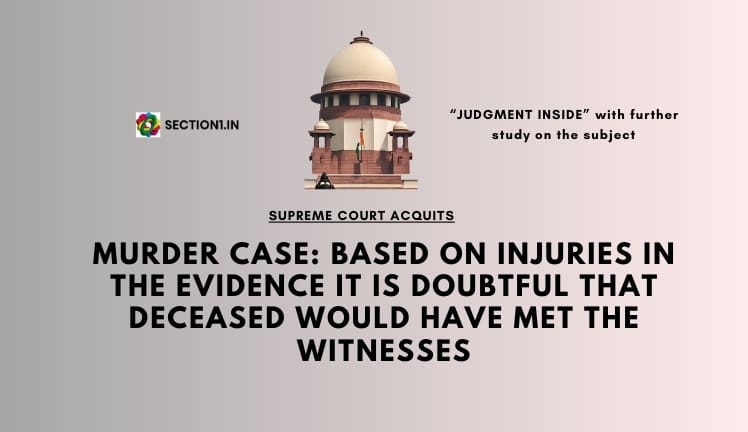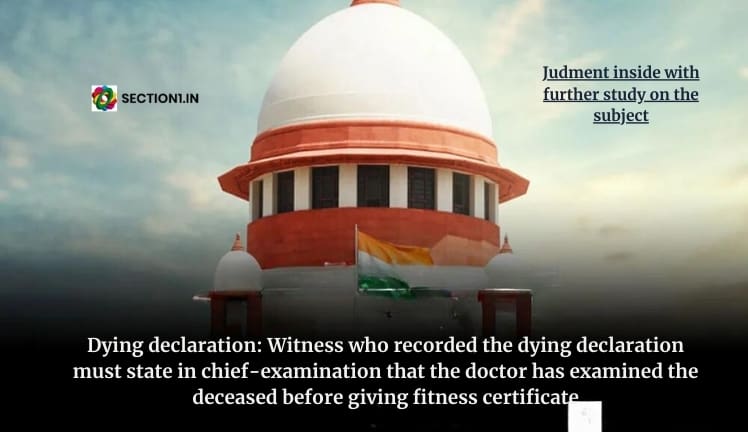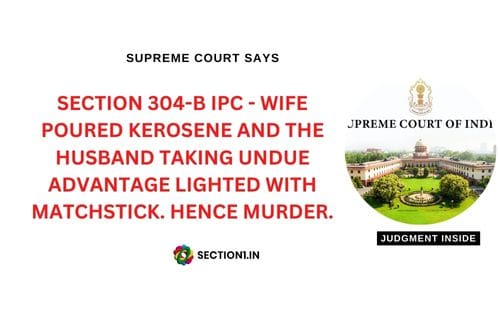STATEMENT MADE TO DOCTOR – EVIDENTIARY VALUE
7. At this juncture, it is pertinent to discuss the evidentiary value of the statement made to a doctor. In the decision in P.Babu and others vs. State of Andhra Pradesh [(1994) 1 Supreme Court Cases 388], it has been held thus:
“It is a matter of common knowledge that such entry in the injury certificate does not necessarily amount to a statement. At that stage the doctor was required to fill up that column in a normal manner and it was not the duty of the doctor to enquire from the injured patient about the actual assailants and the inquiry would be confined as to how he received the injuries namely the weapons used etc.”
Similarly, in the decision in B.Bhadriah and others Vs. State of Andhrapradesh (1995 Supp(1) Supreme Court Cases 262), it has been held that the injured witness is not expected to give a detailed report to the doctor and that the casual way of filling up the column in the medical certificate, would not, in any manner, amount to recording the statement of the injured witness. That apart, the entry in the Accident Register (Ex.P10) is only a previous statement of the victim and such a previous statement is not a substantive piece of evidence. It could be only used to corroborate under Section 157 or contradict under Section 145 of the Indian Evidence Act. If the victim is to be contradicted on such previous statements, he/she should have to be confronted with it in the cross examination as mandated under Section 145 of the Indian Evidence Act. That has not been done in the instant case. Therefore, this argument fizzles out.
DYING DECLARATION NOT USED BY THE PROSECUTION
8. Similarly, non examination of the contractor Rajni is not fatal to the case of the prosecution as contended by the learned counsel for the appellant as he was not present in or near the scene of occurrence. There is also no suppression of the statement of the victim by the prosecution. In fact the Investigation Officer had recorded his statement under Section 162 of the Code of Criminal Procedure and it is very much available in the bundle. The prosecution had failed to mark this particular document treating the same as dying declaration of the victim. A perusal of Section 162 Cr.P.C and Section 32 of the Indian Evidence Act reveals that a statement of a person recorded under Section 162 Cr.P.C would be treated as a dying declaration after his death. In the decision in Sri Bhagwan vs. State of U.P. [2013 12 SCC 137], the Apex Court held thus:
“21. As far as the implication of 162(2) of Cr.P.C. is concerned, as a proposition of law, unlike the excepted circumstances under which 161 statement could be relied upon, as rightly contended by learned senior counsel for the respondent, once the said statement though recorded under Section 161 Cr.P.C. assumes the character of dying declaration falling within the four corners of Section 32(1) of Evidence Act, then whatever credence that would apply to a declaration governed by Section 32(1) should automatically deemed to apply in all force to such a statement though was once recorded under Section 161 Cr.P.C. The above statement of law would result in a position that a purported recorded statement under Section 161 of a victim having regard to the subsequent event of the death of the person making the statement who was a victim would enable the prosecuting authority to rely upon the said statement having regard to the nature and content of the said statement as one of dying declaration as deeming it and falling under Section 32(1) of Evidence Act and thereby commend all the credence that would be applicable to a dying declaration recorded and claimed as such.”
Section 32 of the Indian Evidence Act expresses statements are relevant whether the person who made them was or was not, at the time when they were made under expectation of death and whatever may be the nature of the proceeding in which the cause of his death comes into operation. Section 162(2) Cr.P.C. reads as under:
“(2) Nothing in this section shall be deemed to apply to any statement falling within the provisions of clause (1) of section 32 of the Indian Evidence Act, 1872 (1 of 1872), or to affect the provisions of section 27 of that Act.
Explanation:- An omission to state a fact or circumstance in the statement referred to in sub- section (1) may amount to contradiction if the same appears to be significant and otherwise relevant having regard to the context in which such omission occurs and whether any omission amounts to a contradiction in the particular context shall be a question of fact.”
In the decision in LaxmanVs. State of Maharashtra [2002 6 SCC 710], the Constitution Bench of the Apex Court had considered the question of nature of medical certification regarding fitness of victim to make a dying declaration. In the instant case, the statement of the victim under Section 162 Cr.P.C. was recorded on 22.05.2016 by the Investigating Officer. In any event, this statement of the victim had not been used by the prosecution to prove the guilt of the accused.
13. It’s a single act of the appellant in the heat of anger. Such moments generally blind the sobriety of men, in general, and urge them to deeds which they would not otherwise do. There was no previous deliberation or determination to fight. In the instant case, the fight took place suddenly for which both the parties are to be blamed,. However, the assailant did not suffer any injury and it was only the deceased victim and P.W.1 who bore the brunt of the attack. In fact the deceased was in the hospital under treatment for three days and thereafter, succumbed to injuries. It can be easily inferred that the death in the instant case was caused
i. without any premeditation.
ii. in a sudden fight.
iii. without the appellant taking any undue advantage of
acting in a cruel manner.
iv. the fight was with the deceased victim.
v. The victim died after 3 days of the occurrence.
However, the appellant had an intention to cause bodily injury to P.W.1 and the victim.
14. Appropriate sentencing is a very vital function and obligation of the Court and in the facts and circumstances of the present case, it is difficult to maintain the conviction of the appellant under Section 302 IPC. Hence, the conviction under Section 302 IPC by the trial judge is liable to be set aside and the appellant is convicted under Section 304 Part I IPC and sentenced to undergo 10 years rigorous imprisonment without remission benefits and to pay a fine of Rs.1,000/- in default, to undergo simple imprisonment for three months.
PARTY: Gandhi @ Gandhivel vs. State Rep. by The Inspector of Police, Saibaba Colony Police Station, Coimbatore District – Crl.A.No.714 of 2018 – 19.01.2022.
URL: Download
Files :






